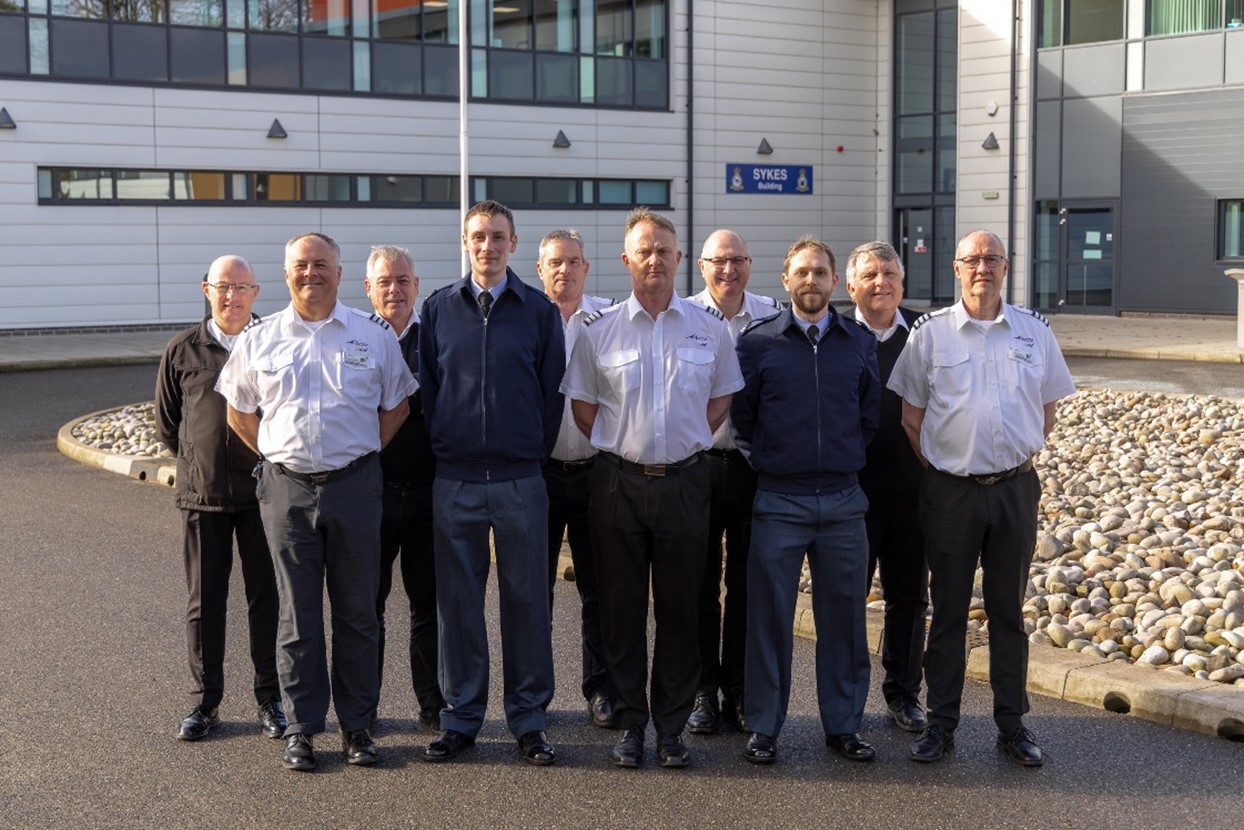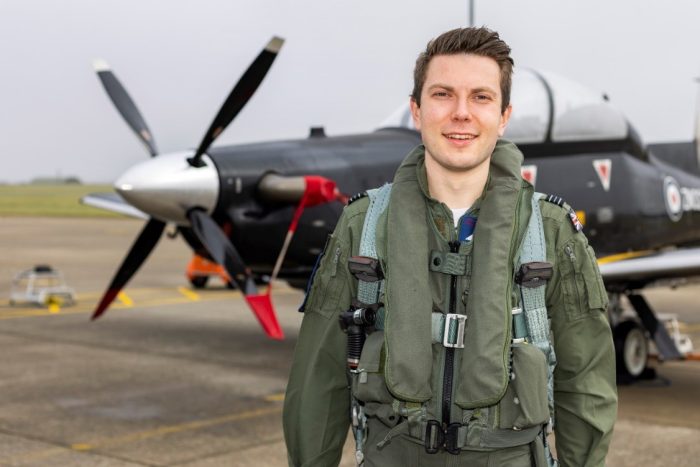Military Aviation Ground School welcomes 100th class

Class 100 trainees and instructors. Front left to right – Steve Barnsley, Sgt David Curtis, Martyn Davison, Sgt Owen Page, Lea Dunning. Rear left to right – Harry Hawksworth, Andy Parker, Manni Kluge, Tim Croydon and Gary Weightman
In December 2017, the Ascent Flight Training team at RAF Cranwell began its 105 Military Aviation Ground School (MAGS) courses. Nearly six years later, as the team welcomes its 100th class, we look back at how MAGS has developed, speak to some of the very first class to see where they are now, and look to the future and the aircrew of tomorrow, with Class 100.
Ascent Flight Training was appointed in 2008 to design and deliver a modern and efficient flying training system by the UK MOD. It was created as a joint venture between Lockheed Martin and Babcock International, working in partnership alongside DE&S (the MOD’s procurement agency), 22 Group and Air Command, in delivering UKMFTS.
The MAGS course is delivered to trainees at No. 3 Flying Training School at RAF College Cranwell exclusively by Ascent instructors with decades of military experience. Alongside RAF-delivered General Service Training, the course marks the start of the journey for aircrew of all specialisations – providing a strong foundation of knowledge for their future military careers.
The MAGS course delivers an academic grounding on the theory, principles and procedures of flying, through the use of aircraft, simulators and training devices. It lasts for just under six weeks, with 11 subjects being taught:
- Flight regulations
- Flight planning
- Theory of flight
- Communications and electronic warfare
- Aircraft systems
- Airmanship, flight safety and emergency procedures
- Recognition
- Navigation theory
- Aviation weather (run by the Met Office)
The statistics
As of March 2023, 826 RAF, Royal Navy, Royal Marines and Army trainees have graduated from the MAGS course, guided by 12 qualified instructors and 2 Met Office instructors.
Qualified instructors have decades of military experience drawn from over 30 different aircraft types and all aircrew specialisations. The course has also been attended by international trainees from New Zealand and Saudi Arabia.
Passing the baton
For the dedicated MAGS instructors, providing the next generation of aircrew with secure educational foundations on which to build their careers, is key to the ongoing success of the training programme.
Martyn Davison, Ascent’s Chief Qualified Instructor at RAF Cranwell explains: “The expertise, passion and professionalism the QIs and QFIs provide doesn’t just enable the aviators of tomorrow to carry out successful flights. These instructors know what it’s like to be in the trainees’ shoes and have insight and real-world experiences to share.”
Qualified Instructor Tim Croydon agrees: “I take immense pride and satisfaction being a qualified instructor with the Ascent team here at RAF Cranwell. Drawing upon 34 years of military flying experience, my aim is to enthuse and motivate the next generation of aircrews by bringing my lessons ‘to life’ with real-world operational experience and case studies.
“I enjoy a fantastic rapport with our trainees, and it’s hugely gratifying to see everyone develop and fulfil their dreams as they reach the frontline.”
Class 1 – coming full circle
Back in 2017, Flt Lt Matt Kenealy, 72(F) Sqn, was part of the very first Ascent MAGS class at RAF Cranwell. Matt had always been interested in aeroplanes, but hadn’t considered being a pilot until learning how to fly on the UAS.

“MAGS provided the foundation for a lot of the knowledge that I have developed throughout my training, and it gave me awareness of how the military operates in aviation,” he said.
Matt has now come full circle. He became a Qualified Flying Instructor in 2022 and is now passing his knowledge on to future aviators. So, what advice would he have for the MAGS Class 100?
“The most important thing on any flying training course is to help each other out, sharing your mistakes, strengths and weaknesses to make everyone better. You learn the most from each other,” he said.
“The end of flying training may seem like a long time away (particularly with holds) but being on a course is the most enjoyable time that you will have, so try and take it one step at a time.”
Matt’s fellow graduates from Class 1 have also shared tips for Class 100 including: “Make sure you have a sound understanding of the fundamentals”, “it gets busy at times, so make the most of when it’s not” and “look after your mates and look after yourself”.
Future aviators
Looking to the future, the next 100 MAGS classes are expected to contain a larger percentage of RAF trainees, alongside naval students. MAGS is already seeing increasing numbers of female trainees, and a wider range of diversity in background and it is hoped this upward trend will continue.
Ongoing customer satisfaction ratings ensure the MAGS team is able to address any concerns and feed back into the training system.
Ascent General Manager at RAF Cranwell, Darren Arch said: “MAGS represents the very start of the military aviator’s professional training, setting the foundations for their career ahead. As such, it is essential we provide a solid grounding from which they can build successfully.
“The MAGS course has been continually improved since Course 1 back in 2017 and covers a wide range of aviation-related topics. I’m incredibly proud of the training delivered by our highly experienced team here at Cranwell, all endlessly enthusiastic to pass on this essential aviation knowledge to the next generation.”
So, what are the members of Class 100 looking forward to in the coming years?
For Sgt David Curtis from Newcastle, supporting operations worldwide and being part of an incredible team are key.
“It’s great to be a part of the 100th milestone course,” he said. “The time, effort and dedication put into the course by the instructors is clear, and graduating as Class 100 will leave me confident I have received the very best training.”
Sgt Own Page agrees: “I feel incredibly proud to be a part of such a historic milestone for such a prestigious school. It’s vital to take note of past graduates’ experiences, to ensure you can maximise your learning and make full use of your time on the course.”
All imagery Crown Copyright

